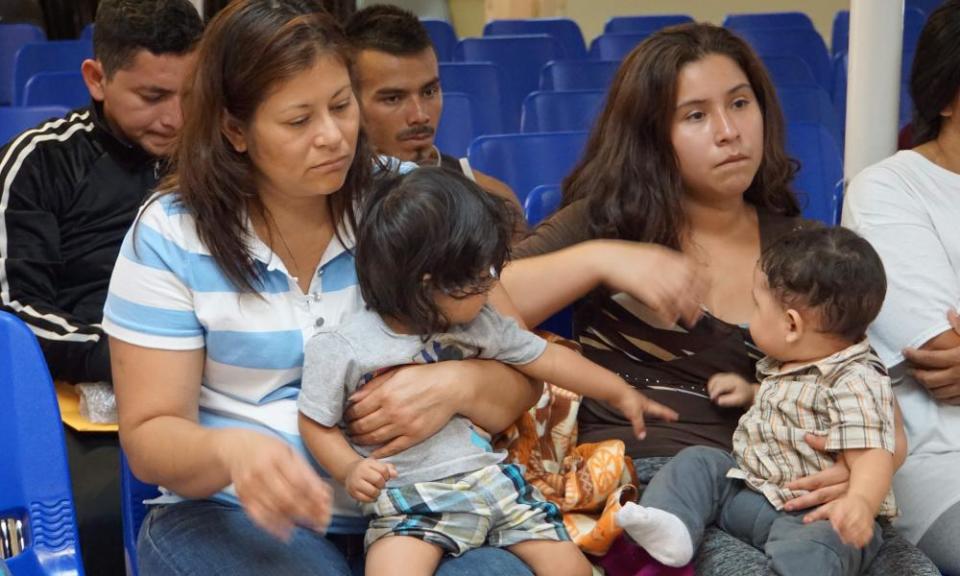US government accused of 'devastating damage' to families separated at border
Lawsuit says the government should provide mental healthcare, establish a fund for treatment and pay damages to those harmed

Children who won’t leave their parents’ side. Parents tormenting themselves every night for not having been able to stop their children being torn away by border patrol agents.
This is what’s left behind months after the Trump administration cancelled its family separation policy, which saw the US government separate more than 2,300 children from their parents at the US border with Mexico.
There are still 416 of those children who have not been reunited with their parents – and even the families who have been reunified are suffering from the traumatic experience. In an effort to address this trauma, lawyers have filed a federal lawsuit arguing the US government should provide mental healthcare to the affected families.
The complaint, filed in Massachusetts district court last week, accuses the US government of betraying the constitution and having “harmed the most vulnerable: children”.
It also calls on the US government to establish a fund for mental health treatment for the parents and children separated at the border and to pay damages to those harmed.
“The case is focusing on mental health because that is where the most devastating damage has been inflicted upon these children and it is an area where the law provides a remedy,” the lead attorney, Howard Cooper, told the Guardian.
Two families are plaintiffs in the class-action lawsuit, which seeks mental healthcare for all separated families.
“I do think it’s fair to say that it’s extraordinarily doubtful that the defendants would of their own accord take any steps to try and undo any harm they caused and the intention is that the court should impose that remedy,” Cooper said.
The plaintiffs, who fled Guatemala intending to seek asylum in the US, described in court documents their relief at meeting border agents – only to be put through further trauma in US custody.
One father, who was separated from his 11-year-old son for 36 days, said since their reunification, the child wakes up from nightmares that are so bad he sometimes falls out of bed.

They approached the border on 17 June having left Guatemala because organized crime members extorted the father and threatened to kill him and his family, according to the lawsuit.
While detained, the child named as CJ in legal documents, said he eventually believed he would never see his father again and would spend years in detention. “While the relief and joy they both felt at seeing each other again was overwhelming, the harm that Defendants caused to CJ during the time that he was separated from his father and in Defendants’ custody can never truly be remedied,” the lawsuit said.
The medical community warned the Trump administration that its policy could cause long-term harm to the families already traumatized by the circumstances that drove them from their homes and the difficult journey to the border.
The American Psychological Association CEO, Arthur Evans Jr, wrote to Trump in June to explain how family separations psychologically harm children. “As psychologists, we have documented multiple harmful effects of parent-child separation on children’s emotional and psychological development and wellbeing and urge that the current policy of family separation be reversed,” Evans said.
Evans also warned that policies like this could harm the mental health of immigrants who are already in the US.
The US justice department did not respond to requests for comment.
By the time Trump ended the policy with an executive order on 20 June, more than 2,300 children had been separated from their parents.
One of those families includes plaintiffs 17-year-old EO jr, his sister, nine-year-old KO and their mother, LJ.
The brother and sister were separated from their mother after walking five hours looking for a border agent. The children remained close, but were held in separate cells, put on separate airplane seats when being transported from the border to a children’s shelter and told not to speak to each other in the border detention facility, according to court documents.
Their mother, LJ, said her daughter follows her mother everywhere and is afraid they will be separated again. “The guilt that LJ feels as a mother is overwhelming,” the lawsuit said. “She feels as if she was unable to protect her children.”
The American Civil Liberties Union, which brought the first legal case against family separation in February, also proposed a measure to address mental health in its case seeking reunification for all families.
Though groups of people have sought damages from the US government before, Cooper said: “I am unaware of a case like this previously where there is a class of children seeking uniquely damages related to mental distress caused by the United States government.”
